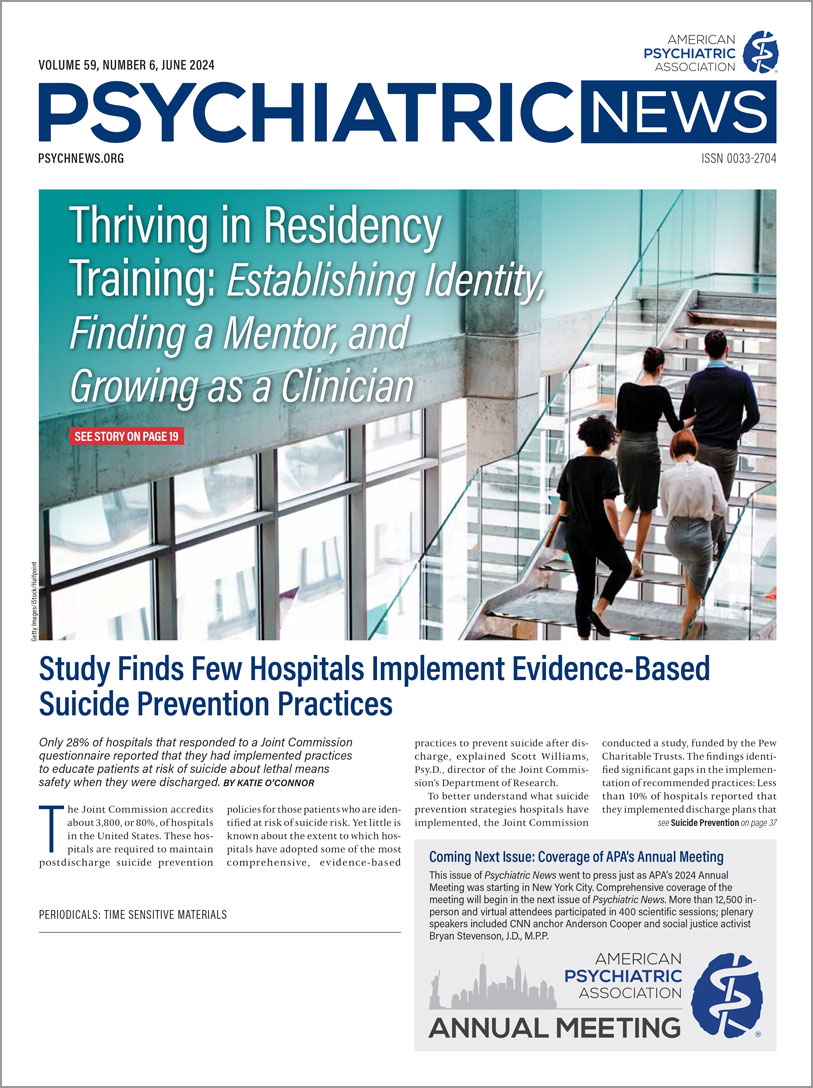NIAAA Marks 50 Years With Special Research Track
Abstract
Attendees will have the opportunity to learn about the latest advances in the treatment of alcohol use disorder, explore new NIAAA resources that can be integrated into clinical practice, and more.
A special research track organized in conjunction with the National Institute on Alcohol Abuse and Alcoholism (NIAAA) at APA’s Annual Meeting in Philadelphia will feature an exciting lineup of sessions on the latest advances in alcohol research, as well as a 50th anniversary tribute to NIAAA.
Sessions in the NIAAA research track include the following:
“NIAAA 50th Anniversary—Alcohol Use Disorder: The Brain, the Pain, and Alleviating the Shame” (Sunday, April 26, 10 a.m.-11:30 a.m.): NIAAA Director George F. Koob, Ph.D., will describe how decades of research led to the identification of key neurocircuits that underlie alcohol addiction. Koob will also detail how significant overlap in the engagement of brain circuits mediating emotional pain and physical pain may help to explain the role of alcohol in “deaths of despair.”
“Understanding Pathways of Recovery From an Alcohol Use Disorder” (Saturday, April 25, 8 a.m.-9:30 a.m.): Brett Hagman, Ph.D., from NIAAA chairs this session with speakers Jalie Tucker, Ph.D., Stephen Maisto, Ph.D., and John Kelly, Ph.D. They will provide findings from a series of prospective studies of natural recovery attempts among problem drinkers, examine how time and areas of individual functioning are critical for defining recovery from alcohol use disorder, and discuss how individuals with alcohol or drug use disorder achieve long-term stable remission and experience enhanced quality of life.
“New Approaches to the Study and Treatment of Risky Drinking and Alcohol Use Disorder” (Saturday, April 25, 10 a.m.-11:30 a.m.): Katie Witkiewitz, Ph.D., will describe harm reduction and mindfulness-based approaches for addressing alcohol misuse and alcohol use disorder (AUD). She will also discuss the importance of reducing alcohol consumption as a public health priority.
“Harmful Drinking Among Women and Girls: SBIRT and Beyond” (Saturday, April 25, 1 p.m.-2:30 p.m.): NIAAA’s Deidra Roach, M.D., chair of this session, and speakers Mary McCaul, Ph.D., Stacy Sterling, Dr.PH., M.S.W., and Grace Chang, M.D., M.P.H., will highlight current research on alcohol screening and brief intervention and discuss alcohol specialty treatment services for women and girls.
“Alcohol and the Immune System Interactions: Challenges and Opportunities” (Sunday, April 26, 8 a.m.-9:30 a.m.): This symposium, chaired by NIAAA’s Changhai Cui, Ph.D., features Gyongyi Szabo, M.D., Ph.D., Adron Harris, Ph.D., and Kevin Tracey, M.D., who will provide an update on the effects of alcohol on innate and adaptive immune responses, how altered neuroimmune signaling contributes to excessive alcohol consumption, and the use of bioelectronic medical devices as a novel approach to inhibit organ inflammation.
“Deaths of Despair: Alcohol Misuse and Psychiatric Comorbidities” (Sunday, April 26, 3 p.m.-4:30 p.m.): Symposium Chair Aaron White, Ph.D., of NIAAA, along with speakers Richard Grucza, Ph.D., and Ismene Petrakis, M.D., will explore the recent rise in midlife mortality, including deaths from drug and alcohol overdoses, suicides, and liver disease. They will further explore the changing patterns of alcohol use and psychiatric comorbidities contributing to these deaths.
“Fetal Alcohol Spectrum Disorders (FASD): What Mental Health Providers Need to Know About Identification, Prevalence, Risk Factors, Treatment, and More” (Monday, April 27, 8 a.m.-9:30 a.m.): This symposium, chaired by Bill Dunty, Ph.D., of NIAAA and featuring speakers Christina Chambers, Ph.D., M.P.H., Sarah Mattson, Ph.D., and Alan Unis, M.D., will explore FASD risk factors, common cognitive and behavioral impairments in people with FASD, and treatments. The information will support a pragmatic approach to assessing and treating children, adolescents, and young adults who have been prenatally exposed to alcohol and experience psychiatric disorders, with a focus on strategic psychotropic interventions.
“The NIAAA Alcohol Treatment Navigator: What It Can Do for You and Your Patients” (Monday, April 27, 10 a.m.-11:30 a.m.): NIAAA’s Laura Kwako, Ph.D., will outline the content of NIAAA’s Alcohol Treatment Navigator, a website for individuals with AUD and the health care professionals who care for them. Kwako will specifically focus on how health care professionals might integrate elements of the portal into clinical practice.
“The New NIAAA Clinician Core Resource: What Every Health Care Professional Should Know About Alcohol” (Monday, April 27, 1 p.m.-2:30 p.m.): In this interactive presentation, Kwako will describe a new online tool NIAAA is developing called the Clinician Core Resource for Healthcare Professionals, which will provide basic information about alcohol and its consequences for health. The resource will include content related to foundational knowledge on alcohol, its clinical impacts, and strategies for prevention and treatment.
“Pain and the Brain: Insights on Opioid Therapy and Alcohol Use Management in People With Chronic Pain Conditions” (Monday, April 27, 3 p.m.-4:30 p.m.): Mark Egli, Ph.D., of NIAAA, Scott Edwards, Ph.D., Jane Ballantyne, M.D., and Joseph Sherman, M.D., will present preclinical findings on the phenomenon of enhanced pain sensitivity (hyperalgesia) in the context of alcohol and opioid use. They will also discuss the roles of hyperalgesia in negative motivational states associated with substance use disorders and in emotional pain, as well as brain neuroadaptations linked to pain-avoidance behavior.
“Screening and Treatment for Alcohol Use Disorder in Patients With Alcohol-Associated Liver Disease” (Tuesday, April 28, 8 a.m.-9 a.m.): Session co-chairs Kathy Jung, Ph.D., and Joe Wang, Ph.D., both of NIAAA, will be joined by NIAAA’s Lorenzo Leggio, M.D., Ph.D., M.Sc., and Jessica Mellinger, M.D., M.Sc., to discuss current biomarkers of alcohol consumption, the biomarker strengths and shortcomings, and the appropriate contexts for their use. This session will also cover wearable alcohol biosensors, including a discussion on the best uses of this technology.
“Gut, Liver, and Brain Interactions in the Etiology and Treatment of Alcohol Use Disorder” (Tuesday, April 28, 1 p.m.-2 p.m.): Steve Kliewer, Ph.D., Craig McClain, M.D., and Leggio will highlight recent findings on gut- and liver-derived factors that contribute to AUD and may be potential targets for AUD treatment. This session will be co-chaired by Jung and Wang.
NIAAA invites all psychiatrists to attend this research series and hopes it is both inspirational and educational. ■



